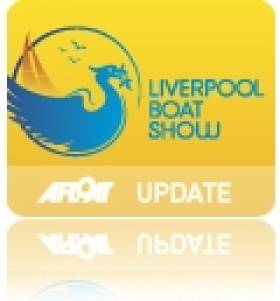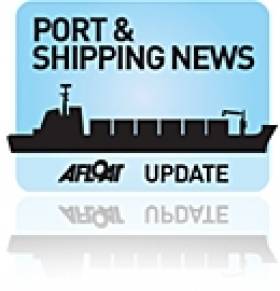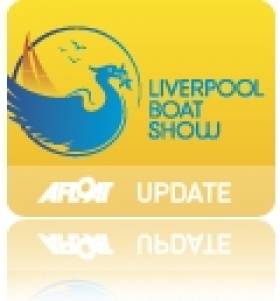Displaying items by tag: Mersey
#liverpoolboatshow – The Northern Boat Show is a festival of boating at the heart of the International Mersey River Festival. This three-day boat show will showcase world class sailing boats, power boats and marine products and services, all set against the backdrop of the Albert Dock.
The latest sailing and power boats will be showcased in Albert Dock and there will be a land-based exhibition on the quayside next to Salthouse Dock. The land-based show will be free to all festival visitors and boat enthusiasts can purchase pontoon tickets to gain exclusive access to the boats on display in Albert Dock.
Location: Liverpool Waterfront, Liverpool L3 4BB. Open 10am to 5pm Fri 5th, Sat 6th & Sun 7th June.
Birkenhead Docks Upbeat On Future Growth
#PORTS – The operator of Birkenhead Docks at Twelve Quays Terminal, says it is confident it will recover the business it lost when DFDS Seaways closed down ferry operations last year, according to a report in today's Liverpool Daily Post.
Birkenhead Port, part of the Peel Group, says overall tonnage for the year to March stood at 3.2m tonnes – down 3% on the previous year. It said the fall was due to DFDS's decision to shut its Birkenhead-Dublin routes in January, 2011 (click HERE).
In accounts newly filed at Companies House, Birkenhead Port said business for the first ten months of the year had been strong. But it said that, in the final quarter, ongoing growth on its Belfast route was "more than offset by the loss of all Dublin volume".
It added: "While, in the short term, the loss of the DFDS business will adversely impact revenues and overall financial result, in the medium term the directors are confident that the company will recover this lost business as we look to contract with another operator at this flagship, purpose-built roll-on, roll-off facility."
It said that, with Stena Line axing its Fleetwood-Larne service, Birkenhead could attract more business to its Belfast route.
Destroyer's Last Visit to Liverpool
The Royal Navy destroyer HMS Manchester is on its last visit to Liverpool, prior to its decommissioning. The Type 42 destroyer is currently berthed at the Liverpool Landing Stage, where she will be open to the public tomorrow (Sunday) between 12 noon and 4 pm.
One of the most notable actions of the warship's three decades in service was during the Gulf War in 1991. The destroyer was engaged in the Persian Gulf. This was primarily to uphold the trade blockade imposed on Iraq during that country's invasion of neighbouring Kuwait.
Special River-Explorer Cruise's run by Mersey Ferries are scheduled for tomorrow. The cruises will provide an opportunity to sail close to the HMS Manchester, which is berthed alongside the Liverpool Landing Stage.
The cruises are scheduled to run between 11 am to 4pm and they include a live commentary from a Blue Badge Guide. On these cruises the normal ticket price applies. For further information contact Mersey Ferries for timetable and ticket fares on 0151 330 1000 or logon to www.merseyferries.co.uk
Ferry-Go-Round on the Irish Sea
In the case of Irish Ferries, their Rosslare-Pembroke Dock route vessel, Isle of Inishmore arrived on the Mersey yesterday at the Cammell Laird dry-dock facility in Birkenhead.
The 1997 Dutch-built Isle of Inishmore had relieved the 50,938 tonnes 'flagship' Ulysses from the Dublin-Holyhead route which too had gone to Birkenhead for maintenance since January 4th.
The Ulysses is now back on service and the company's French routes cruiseferry, Oscar Wilde is covering the Isle of Inishmore's absence from Rosslare-Pembroke Dock sailings.
Continental services to France on the Rosslare-Cherbourg route will resume on February 16th when the Oscar Wilde returns from her overall. The Bahamas flagged vessel will re-open seasonal Rosslare-Roscoff sailings starting on May 13th.
In addition to conventional tonnage Irish Ferries also operate the fast-craft catamaran Jonathan Swift in tandem with Ulysses on the Dublin-Holyhead route. The Ulysses takes 3 hours 25 minutes while the 39-knot catamaran craft marketed as the Dublin 'Swift' is advertised with a scheduled passage time of 1 hour and 49 minutes.
The Australian-built catamaran was taken off the central corridor route yesterday to be drydocked also in Birkenhead until January 18th. Dublin Swift sailings return to the Dublin-Holyhead route on February 19th with the first crossing to depart at 14.30 hours from the capital port.
For the latest information on ferry sailings and reservations click: www.irishferries.com
Mersey's Biggest Sailing Event to be Staged at Liverpool Boat Show
About 150 boats will compete in a series of spectacular races on each of the two weekends of the show, which takes place from April 29 to May 8 next year.
Up to three races will be held each day on the weekends of April 30 and May 7, with classes for modern racing yachts, ultra-fast multi-hulls, local classes and traditional nobbys.
The regattas – comprising the Royal Dee Yacht Club Spring Regatta and the Liverpool Yacht Club Kindred Clubs Regatta – will be one of the main highlights of the Liverpool Boat Show, which takes place in the splendid surroundings of the Albert Dock.
Competitors from across the UK and Ireland are expected to take part in the regattas, which will see boats racing against each other on courses in front of the Albert Dock.
Today organisers urged enthusiasts and clubs to submit their entries for the races to secure a place in one of the most spectacular sailing events of the year.
Alastair Soane, chair of the race committee, said: "This will be the biggest sailing event for probably 70 or 80 years on the River Mersey and interest is already very high."
Alastair Soane, a past Commodore and President of Liverpool Yacht Club who sits on the steering committee of the boat show, added: "We already have expressions of interest from clubs and individuals in Scotland, Wales and Ireland and we are keen to get representation from the sailing fraternity right across the UK, including the South coast.
"The combination of the festival atmosphere of the show and the spectacle of the racing will make these truly unique events and we'd urge potential participants to register as soon as possible."
A number of North West clubs are supporting the regattas, including Liverpool Yacht Club, the Royal Mersey Yacht Club, the Royal Dee Yacht Club, West Kirby Sailing Club, Wallasey Yacht Club, Dee Sailing Club, Blundell Sands Sailing Club, Liverpool Sailing Club, Hoylake Sailing Club, West Lancs Sailing Club and the Nobby Association.
Mr Soane said: "The entire North West sailing community is throwing its weight behind the Liverpool Boat Show and we are determined to make it a show like no other and to showcase to a whole new generation the pleasure and benefits to be had from sailing."

































































